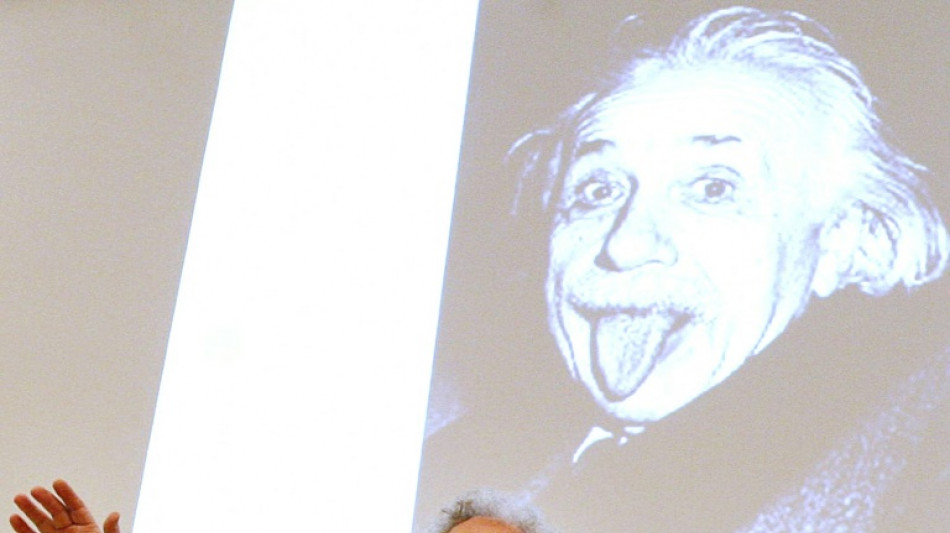
-
 Japan's Takaichi set to call February snap election: media
Japan's Takaichi set to call February snap election: media
-
Scientist wins 'Environment Nobel' for shedding light on hidden fungal networks

-
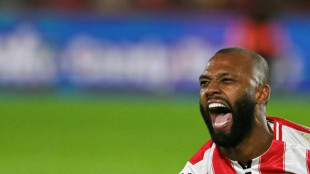 From bricklayer to record-breaker: Brentford's Thiago eyes World Cup berth
From bricklayer to record-breaker: Brentford's Thiago eyes World Cup berth
-
Keys overcomes serve demons to win latest Australian Open warm-up

-
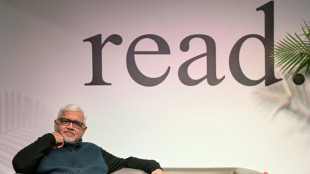 As world burns, India's Amitav Ghosh writes for the future
As world burns, India's Amitav Ghosh writes for the future
-
Actor Kiefer Sutherland arrested for assaulting ride-share driver

-
 Gilgeous-Alexander shines as Thunder halt Spurs losing streak
Gilgeous-Alexander shines as Thunder halt Spurs losing streak
-
West Bank Bedouin community driven out by Israeli settler violence

-
 Asian markets mixed, Tokyo up on election speculation
Asian markets mixed, Tokyo up on election speculation
-
US official says Venezuela freeing Americans in 'important step'

-
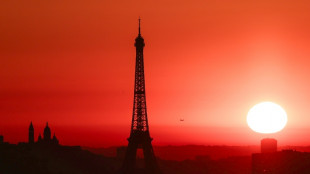 2025 was third hottest year on record: EU, US experts
2025 was third hottest year on record: EU, US experts
-
Japan, South Korea leaders drum up viral moment with K-pop jam

-
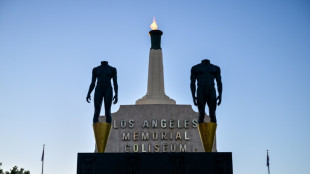 LA28 organizers promise 'affordable' Olympics tickets
LA28 organizers promise 'affordable' Olympics tickets
-
K-pop heartthrobs BTS to kick off world tour in April
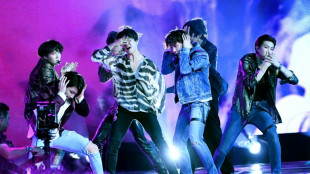
-
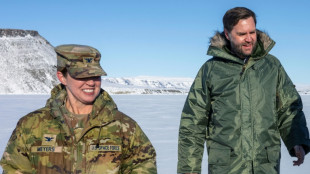 Danish foreign minister heads to White House for high-stakes Greenland talks
Danish foreign minister heads to White House for high-stakes Greenland talks
-
US allows Nvidia to send advanced AI chips to China with restrictions
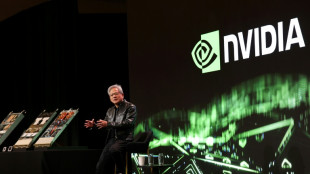
-
 Sinner in way as Alcaraz targets career Grand Slam in Australia
Sinner in way as Alcaraz targets career Grand Slam in Australia
-
Rahm, Dechambeau, Smith snub PGA Tour offer to stay with LIV
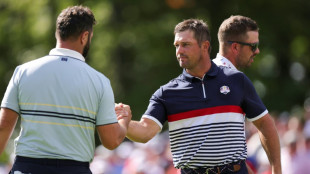
-
 K-pop heartthrobs BTS to begin world tour from April
K-pop heartthrobs BTS to begin world tour from April
-
Boeing annual orders top Airbus for first time since 2018

-
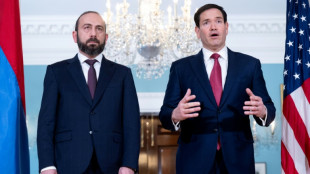 US to take three-quarter stake in Armenia corridor
US to take three-quarter stake in Armenia corridor
-
Semenyo an instant hit as Man City close on League Cup final

-
 Trump warns of 'very strong action' if Iran hangs protesters
Trump warns of 'very strong action' if Iran hangs protesters
-
Marseille put nine past sixth-tier Bayeux in French Cup

-
 US stocks retreat from records as oil prices jump
US stocks retreat from records as oil prices jump
-
Dortmund outclass Bremen to tighten grip on second spot

-
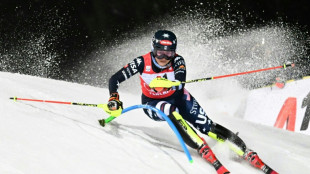 Shiffrin reasserts slalom domination ahead of Olympics with Flachau win
Shiffrin reasserts slalom domination ahead of Olympics with Flachau win
-
Fear vies with sorrow at funeral for Venezuelan political prisoner

-
 Pittsburgh Steelers coach Tomlin resigns after 19 years: club
Pittsburgh Steelers coach Tomlin resigns after 19 years: club
-
Russell eager to face Scotland team-mates when Bath play Edinburgh

-
 Undav scores again as Stuttgart sink Frankfurt to go third
Undav scores again as Stuttgart sink Frankfurt to go third
-
Fuming French farmers camp out in Paris despite government pledges

-
 Man Utd appoint Carrick as manager to end of the season
Man Utd appoint Carrick as manager to end of the season
-
Russia strikes power plant, kills four in Ukraine barrage
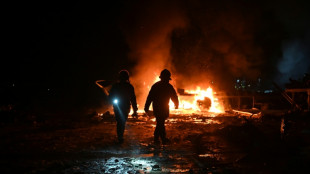
-
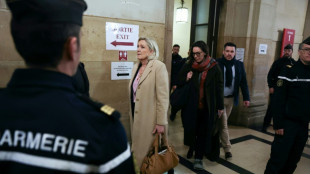 France's Le Pen says had 'no sense' of any offence as appeal trial opens
France's Le Pen says had 'no sense' of any offence as appeal trial opens
-
JPMorgan Chase reports mixed results as Dimon defends Fed chief

-
 Vingegaard targets first Giro while thirsting for third Tour title
Vingegaard targets first Giro while thirsting for third Tour title
-
US pushes forward trade enclave over Armenia

-
 Alpine release reserve driver Doohan ahead of F1 season
Alpine release reserve driver Doohan ahead of F1 season
-
Toulouse's Ntamack out of crunch Champions Cup match against Sale

-
 US takes aim at Muslim Brotherhood in Arab world
US takes aim at Muslim Brotherhood in Arab world
-
Gloucester sign Springbok World Cup-winner Kleyn

-
 Trump tells Iranians 'help on its way' as crackdown toll soars
Trump tells Iranians 'help on its way' as crackdown toll soars
-
Iran threatens death penalty for 'rioters' as concern grows for protester

-
 US ends protection for Somalis amid escalating migrant crackdown
US ends protection for Somalis amid escalating migrant crackdown
-
Oil prices surge following Trump's Iran tariff threat

-
 Fashion student, bodybuilder, footballer: the victims of Iran's crackdown
Fashion student, bodybuilder, footballer: the victims of Iran's crackdown
-
Trump tells Iranians to 'keep protesting', says 'help on its way'

-
 Italian Olympians 'insulted' by torch relay snub
Italian Olympians 'insulted' by torch relay snub
-
Davos braces for Trump's 'America First' onslaught
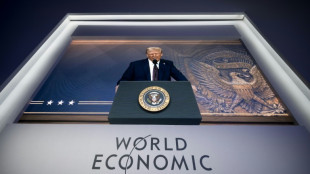

Quantum entanglement: the 'spooky' science behind physics Nobel
This year's physics Nobel prize was awarded Tuesday to three men for their work on a phenomenon called quantum entanglement, which is so bizarre and unlikely that Albert Einstein was sceptical, famously calling it "spooky".
So how exactly does it work?
Even people with degrees in physics struggle to understand it -- and some who do still find parts "hard to swallow," said Chris Phillips, a physicist at Imperial College London.
To explain the phenomenon he used the example of a photon -- "a single unit of light" -- though the theory is believed to hold true for other particles.
If a photon is put through a "special crystal", it can be split into separate photons, he told AFP.
"They're different colours from the one you started with," Phillips said, "but because they started from one photon, they are entangled".
This is where it gets weird. If you measure one photon it instantly affects the other -- no matter how far you separate them.
This is not supposed to happen. Einstein's theory of relativity says nothing can travel faster than the speed of light.
And they are inextricably bound together. When you observe the first photon, there are even odds that it will show itself as "either up or down", Phillips said. But if it is up, then its twin is instantly forced down, or vice versa.
- New way to kill Schroedinger's cat -
He extended the famous quantum thought experiment of Schroedinger's cat, in which a hypothetical animal locked inside a box with a flask of poison remains simultaneously alive and dead -- until the moment the box is opened.
For quantum entanglement, if you have two cats in two boxes, by opening one you would "kill that cat and instantaneously -- on the other side of the universe -- the other cat has been killed," Phillips said.
Phillips has seen this "extremely strange thing" first hand in his laboratory, where he has two beams of photons set up.
"I can put my hand in one beam and something happens to the other beam on the other side of the room instantaneously -- I see a needle flick," he said.
"That would still be true if my laboratory was millions of miles across."
It was the fact that this occurs instantly that bothered Einstein, who dismissed this element of quantum entanglement -- called non-locality -- as "spooky action at a distance" in 1935.
He instead believed that "hidden variables" must somehow be behind what was happening.
In 1964, influential physicist John Stewart Bell found a way to measure whether there were in fact hidden variables inside quantum particles.
Two decades later, French physicist Alain Aspect, who won the Nobel on Tuesday, and his team were among the first able to test Bell's theory in a laboratory.
By testing its limits, they found that "quantum mechanics resists all possible attacks," Aspect said in an interview published by the Nobel Foundation after his win on Tuesday.
- 'Totally crazy' -
In doing so, Aspect proved Einstein wrong. But he was magnanimous to history's greatest physicist.
"I like to say that Einstein's owes a great, great merit in raising the question," Aspect said, adding that "non-locality does not allow you to send a useful message faster than light".
Even Aspect finds it weird to have accepted the idea of something "totally crazy" like non-locality into "my mental images," he said.
The other physics Nobel winners, Austria's Anton Zeilinger and John Clauser of the US, also tested Bell's theory, ruling out loopholes and helping pave the way for what has been called the "second quantum revolution".
Discoveries by Zeilinger, dubbed the "quantum pope", have shown the potential for quantum entanglement to be used in encryption, quantum teleportation and more.
Phillips from Imperial College London has developed a prototype the size of a hi-fi sound system that uses quantum entanglement to diagnose breast cancer.
"We have to be humble in the face of physics," Phillips said, adding that it was the same as any another aspect of nature.
"It just is."
I.Matar--SF-PST




